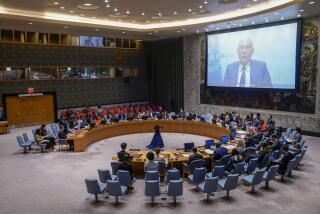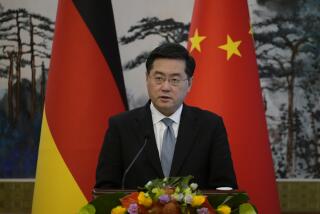China Opposes Sanctions for North Korea : Asia: Premier tells U.N. chief that Beijing favors negotiation, not pressure, to resolve nuclear issue. Their talks come after reports that CIA believes Pyongyang has bomb.
- Share via
WASHINGTON — Amid a growing dispute over reports that North Korea has built its own nuclear bomb, Chinese Premier Li Peng told U.N. Secretary General Boutros Boutros-Ghali on Sunday that Beijing opposes international sanctions to force Pyongyang to accept nuclear inspections.
China supports efforts to eliminate nuclear weapons from the Korean Peninsula, but Li said Beijing favors negotiations to resolve the crisis, the official New China News Agency reported.
“China favors a proper settlement of the issue through dialogues and consultations, instead of imposing pressure and sanctions,” Li told Boutros-Ghali, according to the agency.
The Clinton Administration has indicated that it will press for a U.N. oil embargo on North Korea if the dispute reaches an impasse.
The Administration has expressed optimism that China would back such a move, but Li’s comments Sunday indicated that a conflict within the U.N. Security Council could be brewing. China has a permanent seat on the council and could veto any attempt to impose sanctions on North Korea.
The issue of Pyongyang’s nuclear capability has come to a head over the last year, since North Korea balked at allowing International Atomic Energy Agency inspectors access to all of its nuclear facilities.
U.S. and South Korean officials last week reported that Pyongyang has agreed to allow inspections of its seven acknowledged nuclear facilities. But it has refused access to two installations the government claims are military bases unrelated to the nuclear program.
The talks in Beijing came on the heels of a report that the CIA has informed President Clinton that North Korea has probably assembled one or two nuclear bombs. The report, in Sunday’s New York Times, said the CIA assessment is supported by other U.S. intelligence agencies, but is disputed by State Department analysts.
CIA officials have testified in Congress that North Korea has enough of the ingredients and technology to build one to two nuclear weapons. North Korea denies that it is trying to build a nuclear weapon.
Proof that a bomb has been developed would be significant because it would remove all doubt about North Korea’s intentions and would complicate efforts to end the dispute. Terms of the international Nuclear Non-Proliferation Treaty require collective action against North Korea if it builds a bomb. Also, the Administration’s goal in the dispute would change from preventing development of a bomb to persuading North Korea to surrender the assembled weapons.
“If it’s true, then it dramatically alters the situation,” said Leonard S. Spector, a proliferation specialist at the Carnegie Endowment for International Peace in Washington. “It certainly chills your expectations of what can happen in negotiations. But the United States can still meet the challenge through traditional strategy approaches.”
Despite the likelihood of increased anxiety in South Korea and Japan, Spector discounted the possibility that Washington might consider significantly increasing U.S. troop deployment in South Korea or even redeploying nuclear weapons. He said North Korea might feel forced to respond to such steps.
Yet to avoid an escalation that would jeopardize current negotiations, he predicted that the Administration will probably instead have to “swallow hard” and limit action to reaffirming strong security commitments to South Korea and Japan--at least until current mediation is concluded one way or another.
A White House spokesman said the Administration would have no comment Sunday on the issue of North Korea’s nuclear program or any news reports about it.
The level and sophistication of North Korea’s nuclear weapons program have long been disputed among both government and private analysts--in large part because of limited hard information.
“So much of the information we have is only circumstantial, but there’s a lot of it,” Spector said. “And if you assume the worst about each bit of information--and that’s not unreasonable--then you could conclude they have made a bomb or two.
“But if only one of these assumptions didn’t take place, then they don’t have it,” he said. “All of the assumptions in the worst-case scenario have to be true for North Korea to have a bomb. So there’s still a lot of uncertainty.”
The talks Sunday between Boutros-Ghali and Li were significant because China is North Korea’s closest ally. Japan, South Korea and several Western nations have appealed to Beijing to exert its influence on Pyongyang to comply with provisions of the non-proliferation treaty that it has signed.
Boutros-Ghali arrived in China from talks in both North and South Korea on the nuclear issue. In North Korea, the government of President Kim Il Sung rejected an offer by Boutros-Ghali to help defuse the confrontation over nuclear inspections.
More to Read
Sign up for Essential California
The most important California stories and recommendations in your inbox every morning.
You may occasionally receive promotional content from the Los Angeles Times.













